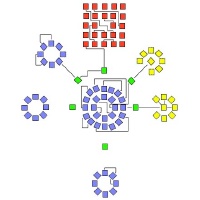Interoperability of Future Information Systems

This Project is no longer active.
One of the more frequent and time consuming activities in resolving network interoperability difficulties is the diagnosis and accommodation of network interoperability problems. The increasingly mobile nature of information system users has produced a need to better support less technically savvy users. Furthermore, progression towards increased system adaptability will in turn increase complexity and lead to less user/admin awareness of the network state, thus requiring new methods of human-computer interaction. As such, our near-term research will attempt to answer the following question:
How does the user diagnose and remedy network interoperability problems?
Network interoperability problems are often highly intertwined with end-user and administrative-user mental models. These mental models in turn affect discussion and communication of events and solutions. The simple act of an administrator diagnosing a problem is often clouded by a fog of uncertainty generated by unexpected or incomplete user reporting. As such, agents and interaction models that support cleaner communication of symptoms, diagnoses, and remedies have great potential.
In certain scenarios external or unchangeable barriers may exist with or without user/admin knowledge. Examples include ISP firewalls and inability to initiate and/or maintain a connection due to local factors (e.g., local policies, noisy phone lines). Good user practices suggest that barriers to the normal interoperability user experience should be identified and detoured with as little pain and human intervention as possible. Identification of such barriers in turn leads to a secondary question:
What options exist given the obstacles imposed by intermediary policies?
There are three core components when traditionally solving network interoperability problems: Identify, Collect, and Solve Problem. These are sometimes assisted by the user/admin Learning from the exercise and adding to / retrieving from a community Knowledge reservoir. This research will seek to improve and extend current Interoperability Problem Resolution Model (IPRM) tasks through human-agent collaboration.
current head
current staff
current contact
past staff
- Michael Rectenwald




